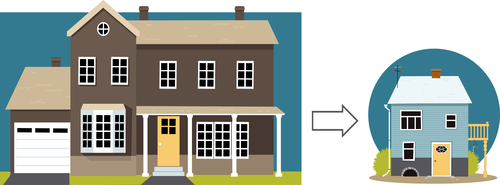By Penelope Graham, Zoocasa.com
Special to the Financial Independence Hub
Despite the efforts of new rules and regulations, real estate prices continue their upward trajectory across the nation; according to the Canadian Real Estate Association, the HPI Index rose in nine of 13 markets in January by an average of 7.7 per cent, while the average home price increased 2.3 per cent, to $481,500.
However, CREA noted that excluding Canada’s largest housing markets – Toronto and Vancouver – would strip a whopping $107,500 out of the national sale price, with the remaining markets contributing to an average of $374,000.
While it has always been more expensive to live in a main city centre than in a rural market, excessively hot price growth over the last few years has increasingly prompted buyers to explore their options in secondary real estate markets, fuelling the migration to further-flung communities with comparatively affordable housing. And, as new stress-testing mortgage rules designed to squeeze affordability are now in place, this big-city exodus won’t slow any time soon.
Savings offered by secondary Real Estate markets
This trend is perhaps most evident in Ontario’s Greater Golden Horseshoe region, home to the City of Toronto and surrounding markets that stretch as far as Niagara, Peterborough and Windsor. Prices have ballooned in Toronto over the last two years and – while slightly softer following the implementation of the Fair Housing Plan last year – remain firmly out of reach for many prospective home buyers. For perspective, the average sale price in the Greater Toronto Area fell 4.1 per cent to $736,783 in January, yet a buyer earning the city’s median household income of $78,280 would qualify only for a maximum mortgage of about $545,692.
One of the most popular real estate destinations for these displaced buyers is the City of Hamilton, located to the west along the shores of Lake Ontario. At a roughly one-hour’s drive from Toronto’s downtown core, and boasting beautiful natural features in addition to a rapidly-gentrifying downtown, home seekers have been drawn to the Hammer in droves.
However, affordability is clearly their main motivation, as freehold Hamilton real estate can be had for a relative bargain compared to its Toronto counterparts, with the average home costing $549,546 in January. That’s a whopping $734,435 less than the average Toronto detached price of $1,283,981.
Is It worth moving to another city?
Such savings are tempting – but there are considerations all buyers should mull over before booking a long-haul moving truck.
Consider Value over Time
As with any real estate investment, it’s important to consider whether the home you’re purchasing is fairly priced and hasn’t been inflated by recent ramp-ups in demand. Hamilton, for example, was predicted to be Ontario’s hottest market in 2016 as the area was flooded with new demand. That’s led to drastic value fluctuations in some neighbourhoods, as seen in the infographic below:
Consider higher travel costs
The trade-off for cheaper houses for sale in Mississauga or condos in Guelph, however, is a longer commute time. Unless homeowners are able to work remotely or find work in their fields in a smaller job market, buying further out means hitting the highway multiple times per day, or taking regional transit. Compared to downtown condo dwellers who may be able to walk or cycle to work, this adds up to higher costs for transit passes, gas, auto maintenance, and higher insurance premiums for increased use.
Higher home fees
Those making the jump from the condo lifestyle to a detached one may celebrate not having to pay maintenance fees, but those costs quickly present themselves in house upkeep. For example, newly-suburban owners may experience sticker shock from higher property tax rates (0.66 per cent in Toronto vs. 1.21 per cent in Hamilton).
Then there’s the upkeep required to keep the structure up to code, the lawn maintained, a larger space heated, and overall greater energy costs. These are all important costs for buyers contemplating a secondary market purchase to keep in mind.
 Penelope Graham is the Managing Editor of Zoocasa.com, a leading real estate resource that uses full brokerage service and online tools to empower Canadians to buy or sell their home faster, easier, and more successfully.
Penelope Graham is the Managing Editor of Zoocasa.com, a leading real estate resource that uses full brokerage service and online tools to empower Canadians to buy or sell their home faster, easier, and more successfully.




